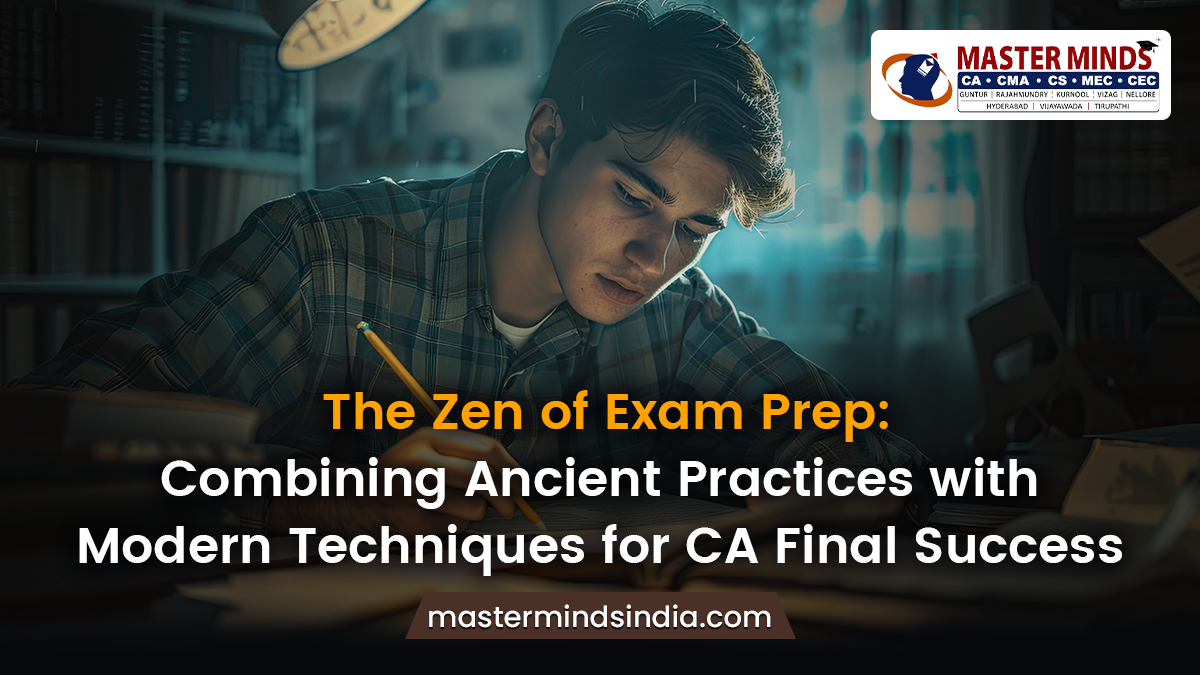Blog
The Zen of Exam Prep: Combining Ancient Practices with Modern Techniques for CA Final Success

Welcome to Mastermindsindia.com. As CA Final students traverse the demanding landscape of exam preparation, integrating ancient wisdom with contemporary study techniques can offer a unique advantage.
By embracing practices such as meditation, Tai Chi, and Zen philosophies, students can enhance focus, reduce stress, and optimize performance. This blog delves into how blending these ancient practices with modern methods can create a holistic approach to CA Final success.
Embracing Zen Practices for Focus and Clarity
Insight: Zen practices, rooted in simplicity and mindfulness, offer profound benefits for concentration and mental clarity. Integrating these principles into your exam preparation can transform your study routine and mental resilience.
Zen Practices to Enhance Exam Preparation:
- Mindfulness Meditation: This practice involves focusing on the present moment, which can improve concentration and reduce anxiety. Regular meditation helps clear mental clutter, making it easier to absorb and retain information.
- Breath Awareness: Simple breath exercises can calm the mind and body, reducing stress and increasing focus. Practicing deep, controlled breathing before study sessions can set a tranquil tone for productive learning.
- Zen Philosophy: Embrace the Zen principle of “being present” in your studies. This involves fully engaging with your current task without distraction, allowing for deeper understanding and retention.
Example: Begin each study session with a 10-minute mindfulness meditation. This practice can help clear your mind of distractions and enhance your ability to focus on complex CA Final concepts.
Flowing Through Stress with Grace and Balance
Insight: Tai Chi, often described as “meditation in motion,” combines gentle physical exercise with mental relaxation. Integrating Tai Chi into your study routine can improve physical well-being and mental clarity, both crucial for exam success.
Tai Chi Techniques for Exam Prep:
- Flowing Movements: The slow, deliberate movements of Tai Chi promote relaxation and balance. Incorporating Tai Chi exercises into your daily routine can help alleviate physical tension and improve mental focus.
- Mind-Body Connection: Tai Chi enhances the connection between mind and body, fostering a sense of calm and control. This practice can help manage exam-related stress and maintain a balanced perspective.
- Breath and Movement Coordination: Tai Chi emphasizes synchronized breathing and movement. This coordination can enhance your ability to remain calm and focused during high-pressure exam situations.
Example: Practice Tai Chi for 15 minutes each morning before studying. This can help you start your day with a balanced mindset, improving your study efficiency and stress management.
Integrating Modern Techniques with Ancient Practices
Insight: Combining ancient practices with modern study techniques creates a synergistic effect, enhancing both mental and physical preparation for the CA Final exams. This holistic approach ensures that you address the exam challenge from multiple angles.
Modern Techniques Enhanced by Ancient Wisdom:
- Active Recall and Meditation: Use mindfulness meditation to prepare mentally for active recall sessions. Meditation can help you approach each recall exercise with a calm and focused mind, leading to better retention.
- Spaced Repetition and Tai Chi: Incorporate Tai Chi breaks into your spaced repetition schedule. The physical and mental relaxation from Tai Chi can enhance the effectiveness of spaced repetition by reducing stress and improving focus.
- Practice Exams and Zen Philosophy: Apply Zen principles of simplicity and presence during practice exams. Approach each question with a clear, uncluttered mind, focusing solely on the task at hand.
Example: Design a study schedule that includes Tai Chi breaks between study blocks and mindfulness meditation before practice exams. This integrated approach can enhance your study efficiency and performance.
You Can Also Read:
- CA Intermediate New Study Material
- CA Course Duration After 10th, 12th & Graduation
- Tips to Crack CA in First Attempt
- Time-Saving Calculator Tricks for CA Foundation Students
- How to become a CA?
- CA Foundation New Syllabus
- CA Inter New Syllabus
- ICAI CA New Scheme
Creating a Balanced Study Routine
Insight: A balanced study routine that incorporates both ancient practices and modern techniques can lead to greater success and well-being. Establishing a routine that blends these elements ensures a comprehensive approach to exam preparation.
Steps to Create a Balanced Routine:
- Morning Routine: Begin with mindfulness meditation to set a calm and focused tone for the day.
- Study Blocks: Implement active recall and spaced repetition techniques, integrating Tai Chi breaks to maintain physical and mental balance.
- Evening Reflection: End your day with a brief Zen-inspired reflection session. Assess your progress, acknowledge your achievements, and plan for the next day with a clear mind.
Example: Your daily routine could include morning meditation, followed by focused study blocks with Tai Chi breaks. Conclude with an evening reflection to review your progress and set goals for the following day.
The Long-Term Benefits of Combining Ancient Practices with Modern Techniques
Insight: Beyond the immediate exam preparation, integrating ancient practices with modern techniques fosters long-term benefits such as improved stress management, enhanced focus, and overall well-being. This holistic approach prepares you not only for exams but for a successful and balanced professional life.
Long-Term Benefits:
- Enhanced Mental Resilience: Regular practice of mindfulness and Tai Chi builds mental resilience, helping you manage stress and maintain focus in various aspects of life.
- Improved Physical Health: Incorporating Tai Chi and other physical practices improves overall health, which supports sustained mental performance.
- Balanced Perspective: Embracing Zen philosophies fosters a balanced perspective, allowing you to approach challenges with calm and clarity.
Example: As you continue your professional journey, the skills and practices cultivated through this holistic approach will support your growth, adaptability, and success in various endeavors.
CA & CMA Online Classes:

